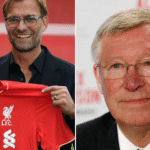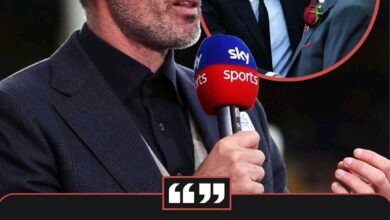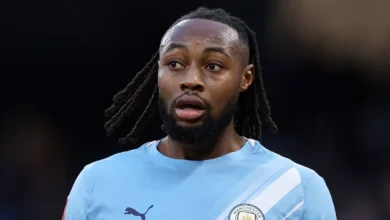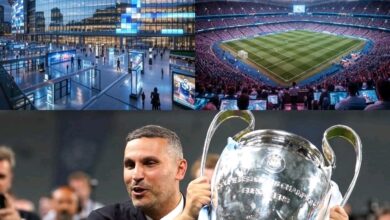Peter Schmeichel was live on air when he went off on an incredible rant at Mikel Arteta
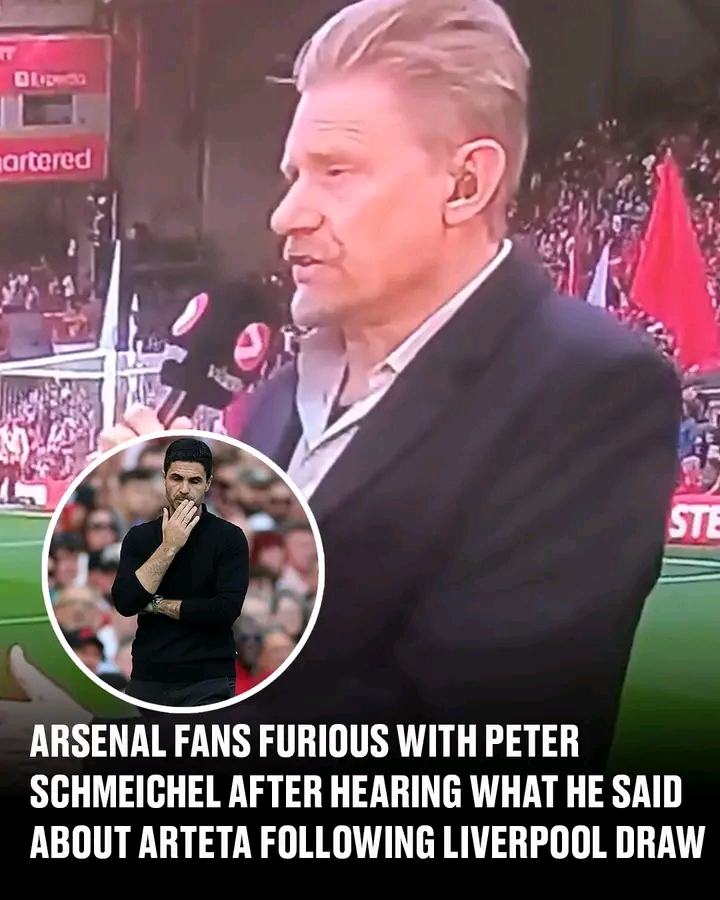
In a scathing assessment that has sparked considerable backlash from Arsenal supporters, Manchester United legend Peter Schmeichel has launched a blistering critique of Mikel Arteta’s management style following Arsenal’s 2-2 draw with Liverpool at Anfield on Sunday. The former goalkeeper’s comments have reignited discussions about Arteta’s tactical approach and touchline behavior as Arsenal’s trophy drought extends for another season
Sunday’s encounter at Anfield demonstrated both Arsenal’s resilience and the continued questions surrounding their ability to secure silverware under Arteta’s leadership. Liverpool initially dominated proceedings, with Cody Gakpo and Luis Diaz establishing a commanding two-goal advantage that threatened to derail Arsenal’s momentum. However, the Gunners displayed commendable character to fight back, with Gabriel Martinelli pulling one back before Mikel Merino’s equalizer secured a valuable point away from home.
Despite the impressive comeback against a formidable Liverpool side, the post-match narrative quickly shifted from the result itself to Schmeichel’s uncompromising assessment of Arteta’s managerial approach. Speaking on ViaPlay following the game, the Danish goalkeeper-turned-pundit placed the entirety of Arsenal’s recent shortcomings squarely at the feet of their Spanish manager.
“It’s all on Arteta, all,” Schmeichel declared emphatically on ViaPlay’s post-match coverage. “What I’m saying is, he was employed as head coach. He inherited the team and that team is the only team that he has won a trophy with. Then it’s his own team and then in the process, he’s now changed the job description so he’s now the manager. Everything is on him. It’s not recruitment, it’s not the board.”
Schmeichel’s critique extended beyond mere results, focusing particularly on Arteta’s animated touchline presence and what he perceives as excessive micromanagement of his players. “Whenever they [fans] get the opportunity today, watch him in the technical area. Arteta is a control freak, he wants his players to play the ball that he wants. He’s directing everything.”
The former Manchester United star drew a stark contrast between Arteta’s frenetic sideline demeanor and the more measured approach of Liverpool’s new manager, Arne Slot. “You look across to Arne Slot who’s so calm. He’s instructed his players in training, instructed the players in the team talk. Arteta is still playing the game for the players and that would confuse the hell out of me as a football player that you had a coach that wants to direct me for everything I do. It would confuse me and make me a worse player.” This pointed comparison between management styles highlights what Schmeichel clearly views as a fundamental flaw in Arteta’s approach—one that he believes actively hampers player development and decision-making on the pitch
Schmeichel’s comments ignited immediate reaction across social media platforms, with Arsenal supporters largely rallying to Arteta’s defense while acknowledging some validity in the critique. The response revealed a nuanced perspective among the fanbase regarding their manager’s animated touchline persona
One supporter on social media platform X (formerly Twitter) questioned the consistency of such criticism by referencing another highly regarded manager: “This is nonsense, has anyone seen Inzaghi on the touch line??” This comment highlights the perceived double standard in evaluating managers’ sideline behavior, suggesting that similar conduct from other successful coaches doesn’t receive equivalent scrutiny.
Another fan demonstrated the divided opinion within Arsenal’s support base: “I understand what he is trying to say. Some fans have complained about the rigidity too.” This acknowledgment suggests that Schmeichel’s observations about Arteta’s controlling approach have resonated with segments of Arsenal’s own fanbase who have harbored similar concerns.
A third supporter emphasized perceived inconsistency in how different managers are evaluated: “Weird, Klopp is regarded as one of the best managers in the PL – he also barked order after order on the touch line. So do other managers. The Arteta agenda is mad.” This response points to Jürgen Klopp’s similarly animated touchline presence throughout his Liverpool tenure, during which he was widely celebrated rather than criticized for his passionate demeanor.
These varied responses demonstrate the complex relationship between Arsenal fans and perceptions of their manager—supportive of his overall project while sometimes questioning aspects of his approach that Schmeichel so directly attacked.
Schmeichel wasn’t alone in his post-match assessment of Arteta’s management. Liverpool legend Jamie Carragher offered a more measured but equally pointed analysis on Sky Sports, focusing on what he perceives as Arteta’s increasingly emotional public persona.
“He’s driving high standards but what really stood out in the interview, and in the last couple of weeks in his press conferences, is that he’s getting emotional and at times he’s sounding a little bit like a fan, not the manager,” Carragher observed. This suggestion that Arteta is losing the professional detachment expected of a top-flight manager represents a subtle but significant critique of his leadership style.
Carragher elaborated on Arteta’s apparent preoccupation with perceived injustices: “He was really strong on how many players they’ve had sent off this season. He’s putting his hands up saying six. I think he’s convinced inside that they have been victims in some ways, with the sendings off and injuries they have had.”
The former Liverpool defender suggested that Arteta has internalized a narrative of external factors undermining Arsenal’s title challenge: “I think deep down he thinks they could have won the league without this and that. There’s no doubt they would be a lot closer but the sendings-off are down to you. They weren’t all sendings-off, but that can happen in a season.”
While acknowledging Arsenal’s impressive competitive showings against Manchester City over the past two seasons, Carragher highlighted a potential vulnerability in Arteta’s approach: “What they have done in terms of competing with Man City in the last two seasons is fantastic but a lot of that was down to having the same eight or nine players week in, week out, and him never rotating.
This observation speaks to deeper questions about Arteta’s ability to manage a squad through the physical demands of competing on multiple fronts—a crucial factor in Arsenal’s continued trophy drought despite their improved league performances
The context surrounding this criticism is Arteta’s overall record since taking charge at Arsenal in December 2019. While the Spaniard has unquestionably elevated the club’s competitive standing in the Premier League—transforming them from mid-table mediocrity to genuine title contenders—the lack of silverware beyond his early FA Cup triumph has become an increasingly prominent talking point.
Arteta’s Arsenal has twice pushed Manchester City to the final weeks of the Premier League season, a significant achievement given the gulf that existed when he took charge. His implementation of a distinct playing philosophy and successful integration of young talent has revitalized a club that had lost direction in the latter years of Arsène Wenger’s reign and during Unai Emery’s brief tenure.
However, as expectations have risen alongside performances, the absence of trophies has become more glaring. The FA Cup victory in 2020 remains Arteta’s sole major honor at Arsenal, and as investment in the squad has continued with his clear influence on recruitment, the pressure to deliver tangible success intensifies with each passing season.
Central to Schmeichel’s critique was the evolution of Arteta’s position at Arsenal—from head coach to manager with broad authority. This transition, which Schmeichel referenced directly, has indeed been a defining feature of Arteta’s tenure.
When appointed in December 2019, Arteta initially held the title of “head coach” within a structure that included then-technical director Edu and a wider football operations team. However, in September 2020, following the FA Cup triumph, Arsenal officially promoted Arteta to “first-team manager”—a title change that reflected his growing influence throughout the club.
This expanded role has given Arteta significant input on recruitment, academy development, and broader club strategy. The Spanish manager has arguably become the most influential figure at Arsenal since Wenger, with his fingerprints visible across all aspects of football operations.
This accumulation of power and responsibility is precisely what Schmeichel highlighted as problematic—suggesting that as Arteta has consolidated control, accountability for the continued trophy drought falls increasingly on his shoulders alone
Perhaps the most visually evident aspect of Schmeichel’s criticism relates to Arteta’s animated touchline behavior. The Arsenal manager has become known for his passionate, sometimes frenetic, presence in the technical area—constantly shouting instructions, gesticulating to players, and responding emotionally to match events.
This touchline demeanor has divided opinion throughout his tenure. Supporters often view it as evidence of his passion, attention to detail, and total commitment to the cause. Critics, now including Schmeichel, frame it as symptomatic of an unhealthy need for control that potentially undermines player autonomy and decision-making.
The contrast Schmeichel drew with Liverpool’s Arne Slot highlights this philosophical difference in management styles. Some coaches believe in extensive in-game instruction, while others prefer to trust the preparation done during the week, intervening only at key moments.
The effectiveness of either approach ultimately depends on how players respond—whether they find constant instruction helpful or distracting. Arsenal’s improved performances under Arteta suggest his methods have largely resonated with his squad, though questions about their ability to make decisive in-game adjustments without managerial prompting remain
Carragher’s comments regarding Arsenal’s disciplinary record touch on another persistent critique of Arteta’s Arsenal. The team has accumulated a concerning number of red cards during his tenure, often at crucial junctures in important matches.
While Arteta has publicly complained about inconsistent officiating, there are legitimate questions about whether his intense approach and the emotional investment he demands from players might contribute to disciplinary lapses under pressure. The frequency of Arsenal red cards compared to their direct competitors suggests a pattern rather than mere misfortune
This disciplinary record has undoubtedly cost Arsenal valuable points and undermined their title challenges. If Arteta perceives these setbacks primarily as external injustices rather than areas requiring internal improvement, it could represent a blindspot in his management approach.
As Schmeichel pointedly noted, Arteta has won just one trophy—the 2020 FA Cup—during his nearly five-year tenure at Arsenal. For a club of Arsenal’s stature and ambition, this represents an undeniable underachievement, particularly given the significant financial backing provided for squad reinforcement.
However, context matters when evaluating this record. Arteta inherited a club in disarray, with an imbalanced squad, fractured dressing room culture, and declining competitive standing. The comprehensive rebuild he has overseen has fundamentally transformed Arsenal’s playing style, squad profile, and competitive mentality.
The challenge of competing against Manchester City’s financial might and established dominance cannot be overlooked. Pep Guardiola’s side has established unprecedented standards of consistency in English football, making the Premier League title an extraordinarily difficult prize to secure.
Nevertheless, as Arsenal’s improvement has elevated them to genuine contention, the absence of silverware becomes harder to justify. The club’s last league title came in 2004, and ending this drought remains the ultimate measure by which Arteta’s tenure will ultimately be judged.
As another season potentially concludes without major silverware, questions about Arteta’s ability to take the final step from contender to champion will intensify. The criticism from respected figures like Schmeichel and Carragher reflects broader industry skepticism about whether Arteta’s controlling approach has inherent limitations at the elite level.
For Arsenal and Arteta, the coming transfer window and next season represent a critical juncture. Having twice pushed City close in the league, expectations will demand tangible success. The club’s continued financial investment in the squad removes any remaining excuses about resources or rebuilding.
If Arteta is to silence critics like Schmeichel, he must demonstrate that his meticulous approach can deliver championships, not just improvement. This may require evolution in his management style—perhaps trusting players with greater autonomy while maintaining the structural discipline that has been the foundation of Arsenal’s resurgence.
The passionate response from Arsenal supporters to Schmeichel’s comments highlights the polarizing nature of discussions surrounding Arteta. His distinctive personality and approach inevitably attract stronger reactions than more conventional managerial figures.
Schmeichel’s Manchester United connections inevitably color perceptions of his critique, with some Arsenal fans dismissing his comments as agenda-driven rather than objective analysis. However, the similar themes raised by Carragher suggest the observations about Arteta’s controlling tendencies and emotional responses reflect genuine patterns rather than fabricated narratives.
As with most managerial assessments, the truth likely lies somewhere between adoration and condemnation. Arteta has unquestionably elevated Arsenal’s competitive standing through his meticulous approach and clear philosophical vision. Yet legitimate questions remain about whether aspects of his personality and management style might ultimately prevent him from guiding Arsenal to the elite honors their improvement deserves.
The intense spotlight on Arteta reflects both the progress he has made and the heightened expectations that progress has created. Having transformed Arsenal from mid-table mediocrity to title contenders, the final step to becoming champions represents his greatest challenge yet—one that will determine whether his tenure is remembered for restoring Arsenal’s competitive relevance or for falling just short of restoring their championship pedigree.
Until that final judgment can be rendered, the debate Schmeichel has reignited will continue to divide opinion among pundits, supporters, and the wider football community—with Arteta’s animated presence on the touchline remaining both his most distinctive characteristic and his most controversial feature.





